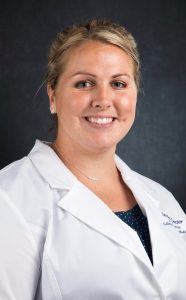by Alethea Gnanakan


Jessica Morris is an EMU graduate from the biomedicine program. She graduated from EMU in 2018 and now attends Liberty University School of Osteopathic Medicine. In the biomedicine program Jess was an extremely successful student and also had a heart for helping students who were currently applying to med school. She is a great example of someone who gives back to the community with knowledge and experience. Thank you, Jess!
A: Tell me some specific ways in which you feel that your time at EMU has prepared you for med school?
J: There are many ways in which I feel my time at EMU prepared me for medical school, with the most significant being learning how to effectively manage my time. I was enrolled full-time, had a job at the hospital as a surgical technician, participated in graduate teaching positions, was involved in research and other extracurricular activities, all of which required me to learn how to set aside enough time to get these things done and leave enough time for myself!
A: What are some classes at EMU that you found particularly beneficial for med school?
J: I would say the classes I found most beneficial for succeeding in the first year of medical school were the developmental biology course, the anatomy course with cadaver dissection, and the physiology course. The first year of medical school is primarily based on the normal anatomy and physiology of the human body, whereas the second year will dive deeper into the pathophysiology of abnormal anatomy and physiology of the human body. I have not participated in research yet, but I am confident the research course and research experience I obtained at EMU will be very useful when I do begin research later this summer.
A: Could you describe your transition from EMU to LUCOM – in terms of a workload and study habits?
J: EMU provided me with a solid foundation to expand from in my transition to medical school. The workload in medical school is by far much more intense; however, without my experience from EMU, I think I would have found this transition much more difficult. I guess you could say EMU was an intermediate stepping stone between undergraduate school and medical school. I truly couldn’t imagine having gone straight to medical school out of undergraduate school – it would have been far more stressful and I would imagine a bit shocking. My study habits definitely changed since starting LUCOM. I used to spend time writing things out from each lecture; however, I learned very quickly that the amount of material is too immense and that was taking way too long. Now, every night when I get home from lecture, I type out my notes in my own words (I type much faster than I write so this saves a lot of time). Also, I have learned certain ways of studying that work for different professors. The key to success is really just staying on top of the material. If you come to class the following day ready to take an exam on the previous day’s material, you are doing what you need to. It requires a lot of discipline, but in the long run, it makes the weekend before an exam (we usually have exams every other Monday) much less stressful.
A: Give us a run down of a day in my life of Jess Morris in Med School?
- I typically wake up between 5 and 6 am, depending on whether I workout in the morning or afternoon (sometimes I just can’t get up at 5 am, because well…I just need the extra hour, ha ha).
- From 5:30 pm to about 7:30 pm, I usually take a mental break. My mental break typically includes a long walk with my dog, shower time, having dinner with my husband, and maybe…just maybe…watching a tv show.
- Around 9:30 pm, I put everything school related away and spend an hour or so with my husband and dog.
- Classes are generally from 8 am to 5 pm every day. Lectures are typically in the morning hours and labs are typically in the afternoon hours.
- From 7:30 to about 9:30 pm, I study that day’s material and if there is time I’ll review material from previous days.
- On weekends, I try to take at least one day to do nothing school-related. This gives me peace and sanity. It also gives me time to spend with my husband, family, and dog.
A: Give us all a peek into what medical school classes are like!
J: The only true way to describe this is drinking from a fire hydrant. In one hour of lecture, I’d say you learn the same amount of material that would have generally taken two weeks or so to learn in undergraduate school. The amount of material you are exposed to in such a short time seems daunting and impossible, but if you quickly learn to manage your time and sacrifice things you once had time to do, it is possible!
A: Did you have any misconceptions in regards to medical school?
J: I wasn’t too surprised at the workload in medical school. It has pretty much been how I expected it to be. As I mentioned previously, I think it would have been more shocking if I had gone straight to medical school from undergraduate school. One thing I would say surprised me is how easy it is to feel like you just don’t measure up. Medical school isn’t just challenging mentally, but it is extremely challenging emotionally. Sometimes you get in a rut and feel like you just aren’t good enough, even when your grades are fine! Having a support system is so incredibly important. My suggestion to fight those rough days is this: when you get your acceptance into medical school, sit down and write how you feel in that moment. Write about how excited you are. Write about how hard you worked to get to that point. Write about the obstacles you overcame. Write about why you really want to pursue this career. When you have a rough day in medical school, pull out that letter. It will remind you of how far you have come. It will remind you that you are good enough and that you belong here. And most of all, it will remind you why you are doing what you are doing.